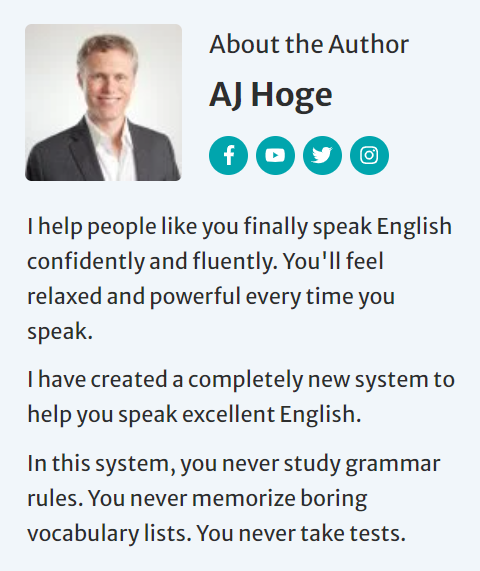English conversation is quite different from English reading. Conversation uses a different type of English, including different vocabulary.
So why do you need to understand conversational English?
In order to understand the English that native speakers use to communicate with one another. You need to learn the English that Americans use with their friends, their families, and their co-workers.
This is the common, everyday English that we constantly use.
And yet, this kind of English cannot be found in English textbooks. Schools don’t teach it. Very few English learners know it. That’s why so many learners come to the United States and can’t understand regular conversations.
In San Francisco, I have met many students with high English test scores and great grades in their English classes. Yet, when they sit at a bus stop they cannot understand what the people around them are saying. They have absolutely no idea what us “normal Americans” are talking about.
They have been trained in formal, academic English with a focus on grammar rules. I think this is totally backward.
Common, casual conversation should be the first thing you learn. The first need, after all, is to communicate with other people. You want to chat with people on the bus. You want to make friends and understand what they are saying. You want to talk to your co-workers. You want to understand TV shows and movies.
Learn that first… then, and only then, focus on academic English.
English Conversation is About Building Connections
English conversation is about connection. Its purpose is to connect people around the world.
We want to connect personally and emotionally. We want to connect with business partners, clients, and customers. We want to connect with professional peers. We want to connect with new friends.
While this is obvious, I feel that many students forget the ultimate reason they are learning. In traditional English conversation classes it’s easy to get too focused on tests, textbooks, grades, and “levels.” After some time, the student is so worried about these artificial measurements that they forget their ultimate purpose for study – to communicate with others.
At the deepest level, English conversation is about community – building and sustaining meaningful connections between people.
Tomoe and I have been discussing this subject a lot and our ultimate goal is to use our seminars, lessons, and forums as a way to create strong communities. We want to help people connect and communicate in positive and meaningful ways – and help them stay connected. We’ll discuss this in more detail below.
The Difference Between Written and Oral English
English conversation vocabulary is much more casual. In English, this means we use more words of Saxon or Old English origin during a conversation. We also use more phrasal verbs (two- or three-word verbs).
The difference between conversation and more formal English is one reason that even “advanced” students have difficulty with everyday conversations.
As we’ve seen, the problem is that students learn more formal English in school. Formal English tends to use more words of French and Latin origin. This kind of English is, in fact, much easier for students who speak Romance languages such as Spanish, Italian, Portuguese, or French. These students often do quite well when reading English but have a lot of trouble understanding “normal” speech.
So, if you want to communicate with native speakers it’s very important to learn English conversation – not just what you learn in books and textbooks.
To learn conversation, you must listen to more casual English and you must learn to understand the different vocabulary and patterns used in normal speech.
In my lessons, I always focus on real English conversation and I use the vocabulary of common speech.
Want to know another great source of casual English conversation?
Movies.
Listen to American and English movies and read the subtitles and this will also help you.
Learn Real English Conversations Today.
Here is a real conversation about the weather, between AJ Hoge and his mom.
What will you learn from this audio session?
How to include an idiom in the conversation and why casual conversation is completely different from “school English.”
You learned school English, you learned textbook English, and you learned them both well – but this is why you can’t understand real conversations. This is why you can’t understand American TV and movies.
School English is not real English.
School English is English written incredibly formally. That is not how we speak in the real world!
Effortless English is a real English system. You learn real conversational English, not textbook English.
In this Show, AJ talks about the importance of real English. He reads a short section from his book and then plays a real conversation with his mom, talking about a recent snowstorm in America.
Finally, AJ answers Twitter questions about American versus British English. Which is better to learn? Which is most useful? Which accent is better? AJ tells you!
LISTEN TO THE AUDIO HERE:
Download the transcript below:





